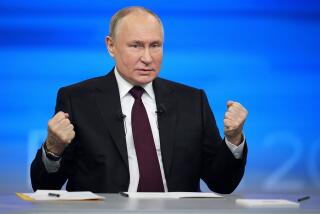Putin Gives Teachers a Big Boost
- Share via
MOSCOW — It was a day of proud parents, starched white shirts, scrubbed faces and shiny hair bows Saturday as 40 million Russian children and teachers headed back to school on the traditional Sept. 1 start of the academic year.
President Vladimir V. Putin made the annual back-to-school observance--known as Knowledge Day--just a little bit more festive for educators when he promised to double the size of the average teacher’s salary, now about $35 a month.
In a speech at the country’s premier teaching college, Putin also pointed out that education will for the first time next year receive more government money than national defense.
“Nothing is possible--not building a democratic society, not creating a market economy--nothing is possible without educated people,” he told the faculty and students at Moscow Pedagogical State University. “We have to be honest: The state has not been giving enough attention to education in recent years.”
The start-of-school habit is so entrenched in Russia that principals of public and most private schools ordered pupils to show up even though Sept. 1 fell on a Saturday. City streets were as clogged with traffic as on weekdays. Schools held special ceremonies to welcome first-graders, who are usually 6 years old in Russia.
In his speech, Putin acknowledged that the government has shortchanged students, with not enough spent on teachers’ pay and a general underfinancing of academic institutions.
In the country’s draft 2002 budget, which is expected to be approved shortly by the lower house of parliament, the State Duma, spending on education is to be increased by 50%, Putin announced. He added that presidential stipends, awarded to the brightest scholars, will double in value.
Putin did not go into detail in his speech about the gap between education and defense spending. But published accounts suggest that the budget draft will allocate 296.1 billion rubles for defense, equal to about $10 billion, or 2.8% of Russia’s anticipated gross domestic product for 2002.
Figures put out this year by Finance Minister Alexei L. Kudrin indicate that total 2002 education expenditures, on the federal, regional and local levels, could top 389 billion rubles, or nearly $13 billion.
Putin was interrupted by applause when he pledged to raise teachers’ pay, and then got a laugh when he responded: “This applause . . . shows how undemanding our Russian people are because this increase, in absolute figures, is not that great.”
He promised, though, to “keep to this direction in the future.”
Although their basic pay is low, teachers often earn additional income by, for instance, supervising extracurricular activities. Some teachers also tutor privately.
Last week, Prime Minister Mikhail M. Kasyanov expressed displeasure at textbooks already approved by the Education Ministry, saying they paint an overly glum picture of Russia’s difficulties since the fall of communism 10 years ago.
Kasyanov complained that when the history of contemporary Russia is discussed, there is too much focus on social and economic uncertainty. The prime minister was “surprised that [some] textbooks never mention the values of democratic society, economic reform, direct presidential and parliamentary elections or regional elections,” state-controlled ORT television said.
“It is not very clear what kind of people these textbooks are supposed to prepare,” Kasyanov said, according to ORT.
More to Read
Sign up for Essential California
The most important California stories and recommendations in your inbox every morning.
You may occasionally receive promotional content from the Los Angeles Times.











